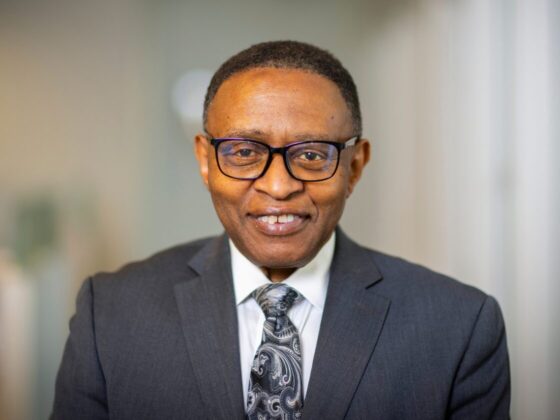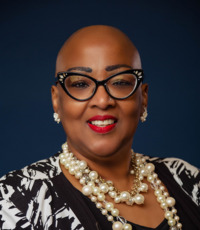News Details
Bringing social work to Penn’s community engagement

Authored by: Carson Easterly
Alumni
10/18/24
Tapping into his social work background to support and cultivate Penn’s relationship with the local community, Glenn Bryan, C’74, SW’76, has spent decades building connections between his alma mater and the place where he grew up.
“I’ve been at Penn for 31 years, and I’ve never had a dull moment,” says Bryan, assistant vice president of community relations at Penn’s Office of Government and Community Affairs (OGCA). The Office is tasked with managing and growing Penn’s local engagement initiatives and partnerships with the surrounding Philadelphia communities.
Bryan was first introduced to community engagement work as a Penn undergraduate when he was hired for a work-study position in the University’s Office of Community External Affairs. “I had really wanted to make a difference in the community and be out there working with different people and organizations, even looking at legislation,” says Bryan, a West Philadelphia native.
While he originally had his sights set on a path to business, Bryan went on to enroll as a master’s student at Penn’s School of Social Work, now known as the School of Social Policy & Practice (SP2). “I’ve always had a drive to deal with social issues; issues that were related to individuals’ quality of life and working with organizations that would actually be effective in providing services and helping others to help themselves,” he says.
As a social work student, Bryan learned about the principles of both macro and micro social work — gaining a valuable skill set that would guide his professional path — and was encouraged to explore and define his values. “I noticed the School of Social Work, in particular, emphasized this focus on values; how the use of oneself is so important in terms of the work you try to do,” says Bryan.
After graduating with his Master of Social Work in 1976, Bryan went on to work in various areas, including early childhood education, substance use, mental health, and aging, and held leadership roles at several small nonprofits. “I used my social work clinical skills in all of those areas of focus,” he says.
In 1993, Bryan sought a new challenge. Revisiting the mission of his work-study experience from many years before, he decided to return to the University in a role focused on community engagement with his hometown.
He first took a role at the Netter Center for Community Partnerships as Director of Community Relations and later transitioned to the newly created Office of Government and Community Affairs. In a new department and as the only social worker in the administration to his knowledge, Bryan seized the opportunity to build a blueprint for the University’s relationships with its neighbors.
His mission was to change the culture of the University and the ways in which it engaged with the community, and Bryan knew he would be navigating a deep and challenging history of Penn in West Philadelphia. At the time, Bryan observed a lack of partnerships and significant connection.
“The University needs to be part of the community,” Bryan says. “In order to create meaningful engagement, the relationship would have to be mutually beneficial, lasting, and sustainable.”
Bryan envisioned his role as that of a change agent for the new department and the University. He immediately set out to make ties with community members, including elected officials and faith-based leaders — aiming to bring Penn into the local scene when many neighbors were hesitant to engage with the University. His social work skills, he says, helped him make and maintain these important connections.
He created an agenda to reimagine community engagement and worked with colleagues across campus to move his plans forward. Pulling from his own perspective as a West Philadelphian and his meetings with community members and local organizations, Bryan developed four pillars which continue to guide his work today: access, educational engagement, health development, and economic inclusion.
A core component of Bryan’s work has been to encourage a strengths-based approach to community partnerships. “It’s a classic social work principle,” Bryan says. “When you develop relationships, you build on the strengths of your partner, not the deficiencies, not the weaknesses.” He set out to educate Penn faculty, staff, and students about the local community and the value in developing meaningful, lasting relationships.
In recent years, Bryan began conducting tours of West Philadelphia neighborhoods for members of the Penn community, including a tour that has been piloted as a new part of onboarding for SP2 faculty and staff. The hour-long tours provide historical context for Penn’s involvement with the community and speak to Penn’s current local engagement and activities in education, economic development, health care, housing, arts and culture, and other areas.
“This is an urban campus, and people should take advantage of that. I think that really benefits their learning,” explains Bryan. He hopes encouraging people to venture off of campus and develop a deeper understanding of Penn’s community will benefit their work and their research.
This year, Bryan will lead his annual tour for new SP2 faculty and staff on October 22. The tour will include a meet-and-greet breakfast with Bryan and a guided exploration of 17 locations across West Philadelphia.
“Glenn is a fantastic member of our SP2 community. This honor is bestowed upon me to work in indirect collaboration alongside a living legend who has significantly contributed to Penn and our neighborhood,” says Tamla M. Tinsley, administrative coordinator, Office of the Dean at SP2. “I’ve enjoyed the opportunity and look forward to working with him each year to assemble SP2’s West Philadelphia guided community tour.”
Bryan is glad to bring his SP2 journey full circle through the tours. “My hope is to help SP2 be positioned to continue making a difference internally and externally, now and in the future,” he says. “SP2 has a history of helping the University to make real change, progress, and improvements in the quality of life for so many people.”
Reflecting on his role at Penn, Bryan believes the path forward must be guided by positivity and a social work mindset. “The community is not always pleased with us,” he acknowledges. “We need to learn from history, but we can’t swim in it. Proactivity and change are values of social work. My mode of operation is to understand the past but focus in on what can happen.”
People
-

Tamla M. Tinsley
Administrative Coordinator, Office of the Dean
Contact
office: 215.746.0560
Email